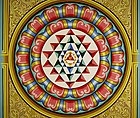|
Baháʼí Faith and Hinduism
Hinduism is recognized in the Baháʼí Faith as one of nine known religions.[1] Krishna is included in the succession of Manifestations of God. References in the Baháʼí writingsBaháʼu'lláh was familiar with Hinduism, which is clear from a tablet to Mírzá Abu'l-Faḍl, the English translation of which is included in the volume Tabernacle of Unity. In this tablet Baháʼu'lláh answered questions about Hinduism and Zoroastrianism by Maneckji Limji Hataria. The subjects include comparative religion, and constitute, while much remains implicit, a dialogue of Baháʼu'lláh with Hinduism and the other religions discussed, giving an understanding of what Baha'u'llah meant with the unity of the world religions.[2] In another tablet (published in Gleanings, section LXXXVII) Baháʼu'lláh discussed the absence of records about history before Adam. Here he refers to the Jug-Basisht which is the Persian translation of the Yoga Vasistha, a syncretic philosophic text.[2] The translation was done during the Mughal Dynasty in the sixteenth century A.D. and became popular in Persia among intellectuals with Indo-Persian interests since then.[3] In the Story of Bhusunda, a chapter of the Yoga Vasistha, a very old sage, Bhusunda, recalls a succession of epochs in the earth's history, as described in Hindu cosmology. Juan Cole states that this means that in dating Creation, Baháʼu'lláh promotes the theory of a long chronology over a short one.[2] In a letter written on behalf of Shoghi Effendi, published in the Dawn of a New Day, p. 198, it is stated that:
TeachingsGodIn Hinduism, Brahman is believed to be the Absolute Reality. Followers of Vedanta see Brahman as an impersonal reality, of which each soul (ātman) is a part. The theistic traditions of Hinduism, which include Vaishnavism and Shaivism, consider Brahman as a personal God, whom they call Bhagwan or Ishvara (Lord).[4] According to the Baháʼí teachings, these differing views are all valid and represent different points of view looking at the Absolute Reality.[5] Avatars and Manifestations of GodBoth Hinduism and the Baháʼí Faith teach that God manifests himself at different times and places. These messengers are termed Avatars in Hinduism and Manifestations of God in the Baháʼí teachings.[6] However the difference is that Hinduism teaches that Avatars are God himself in human form and are thus divine while Baháʼí teachings stress that the Manifestations of God are not God but his representatives.[citation needed] Deities and imagesIn Hinduism many deities, depicted in images and murti (statues), are worshipped. Many Hindus believe that all these deities represent different aspects of the one God, Brahman. The Baháʼí teachings state that in this day, when mankind is reaching the state of maturity, images are not needed anymore to form an idea of God.[7] Ethical and moral teachingsThere are many similarities in the ethical and moral teachings of Hinduism and the Baháʼí Faith. These include subject as contemplation, detachment, faith, love, non-violence, purity, respect for parents, righteousness, self-control, right speech, not stealing, truth, virtue, work as worship.[8] Adaptation of Baháʼí teachings to Hindu context The speedy growth of the Indian Baháʼí community since the 1960s was influenced by adapting the Baháʼí teachings for presentation in a clearly Hindu context familiar to the people of the countryside - using principles and language familiar to them:[9][10]
See also
Notes
References
Further reading
External links
|


